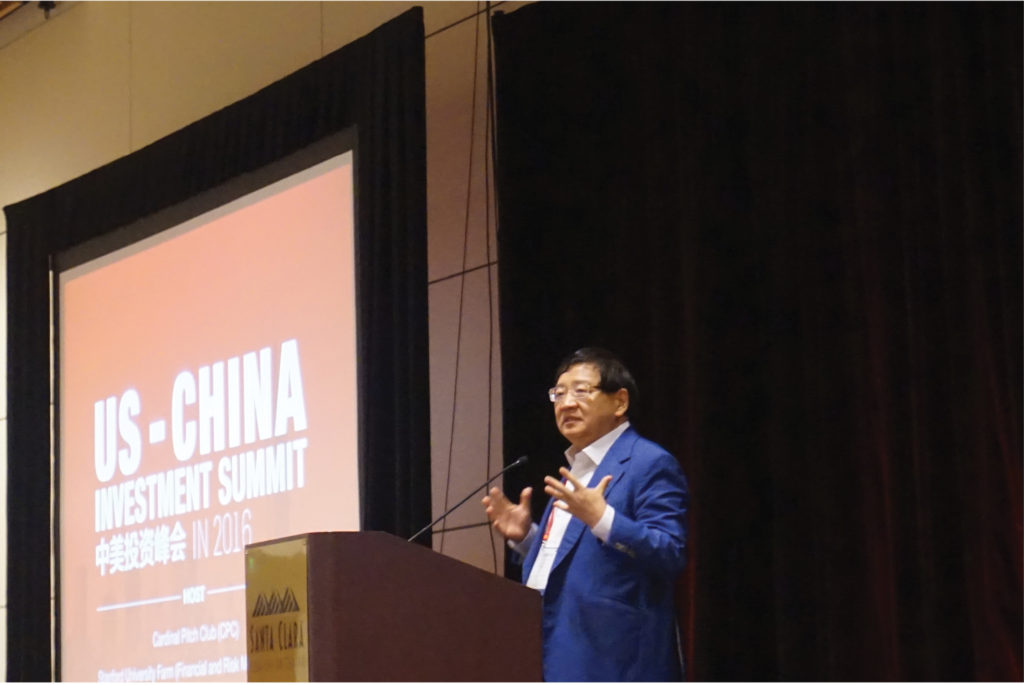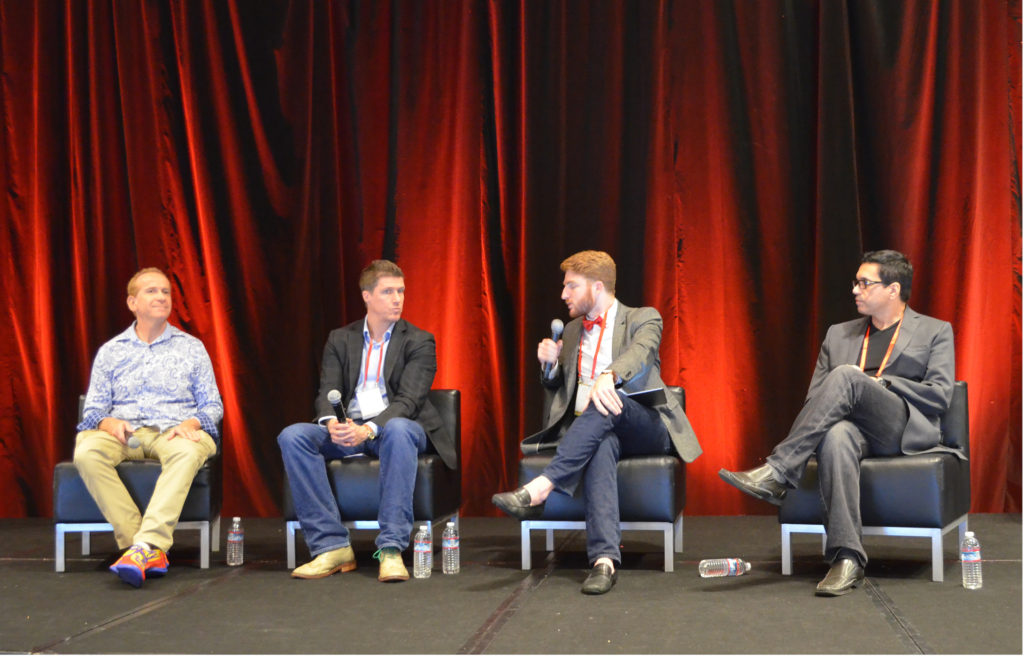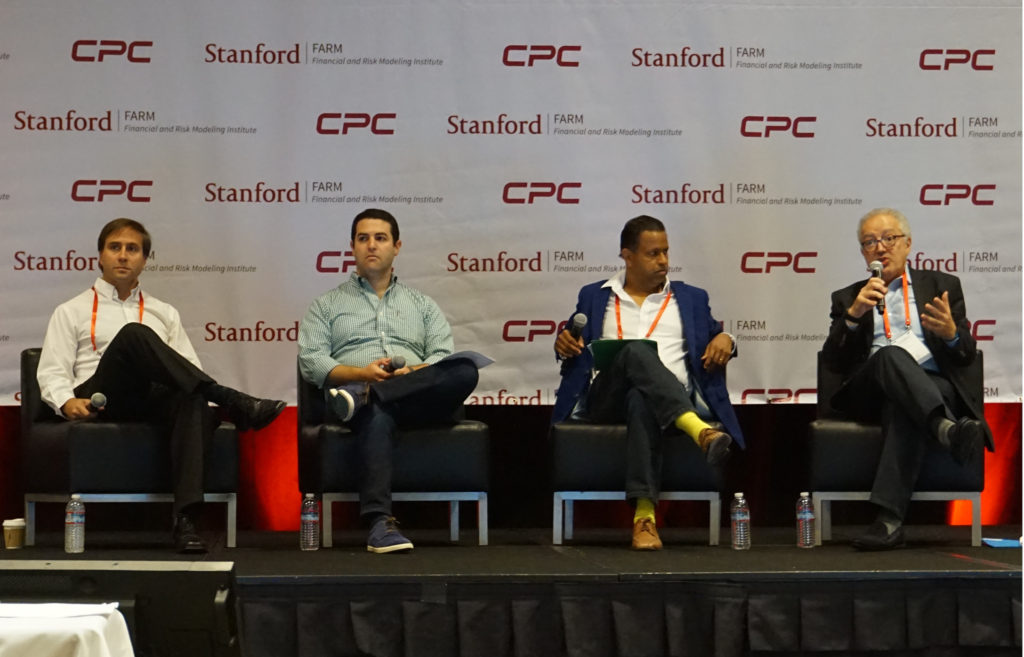The US and China Investment Summit on August 24th-25th at the Santa Clara Convention Center was hosted by the CPC (Cardinal Pitch Club) and Stanford FARM (Financial and Risk Modeling Institute). CPC was founded by Stanford affiliates in April, 2015, consisting of hundreds of institutional and angel investors. They currently have over 1200 members and 600 startups. CPC have started working with Chinese investors since Jan, 2016 to bridge the US and China startup eco-systems.
The Summit attracted many outstanding guest speakers from both Silicon Valley and China, such as renowned angel investor Xiaoping Xu (Zhen Fund), Carmen Chang (Managing Director of NEA), Patrick Eggen (Managing Director of Qualcomm Ventures), Hans Tung (Managing Partner of GGV Capital), Yong Liu (Partner of WI Harper Group), Cameron Teitelman (Founder and CEO of StartX), Robert Neivert (Venture Partner of 500 Startups), Sanjit Singh Dang (Investment Director of Intel Capital), Rashmi Gopinath (Partner at Microsoft Ventures), and many more, sharing their wealth of knowledge and vision.
So, what did we learn from the summit?
Yihang Yang on “Investments Climates in China”
Yihang Yang, the Economic and Commercial Counselor at the Consulate General of China in San Francisco shared some insightful statistics. For 2016, up until the end of July, China inbound investment grew 14.3% to $77.13 billion with 15,802 newly-founded foreign invested companies, a 9.7% growth. The top three countries investing in China are US, United Kingdom, and Germany, growing at 129.8%, 96.8% and 96.6% respectively. China’s outbound investment for the 7 months ending July grew 61.8% to $102.75 billion, compared to $118 billion for the entire year of 2015. It definitely shows a growing trend of investments, with no signs of slowing down, in and out of China.
Minglan Wang on “Collaborations between China & Silicon Valley”
US and China’s collaboration in the startup scene is heavily focused on Silicon Valley. Minglan Wang, the VP of Zhongguancun, the famous incubator community in Beijing, was present at the Summit and talked about the fund that was started with Stanford Professors, currently totally $78 million, with $45 million already invested. Zhongguancun established a new office across from Santa Clara Convention Center on Great America Parkway to foster this cross border collaboration. Silicon Valley bank also has a joint venture with Shanghai Development bank and is the first non-China bank to have such a joint venture in China, offering creative financing options for startups. Twenty-five percent of all VC funding comes from Corporate Ventures, big companies such as Intel with 400-500 million invested per year, Qualcomm, SAP’s Sapphire Venture Fund, Microsoft, etc. as well as ventures funds from Chinese behemoths such as Alibaba, Xiaomi, Tencent, Lenovo, etc. Though we see the funding in tech cooling down, it is certainly healthy for a long term stable market to slow the overheating.

Xiaoping Xu predicts the “Rise of the Angel Investors”
The potential tech bubble rumor has been spreading around for quite some time. Xiaoping Xu of Zhen Fund, however, sees the winter for VCs as the spring for angel investors in China, as there is more room for them to get in on the better deals. This is still different from the investors in Silicon Valley as there are different investment opportunities available.
Tim Merel on “The Rise of China’s economy”
With the rise of China’s economy, Tim Merel, the Founder and CEO of Eyetouch Reality and Digi Capital, thinks that China has transformed from duplicating US’s innovative ideas to being a creative powerhouse in its own right. It will be mutually beneficial to bridge the two markets and find synergy between the technologies. The ecommerce penetration rate in China 2005 was less than 0.1%. In a little more than a decade, China’s ecommerce penetration rate has grown to approximately 36%, generating a revenue of USD$300 million. This is only second to the USD $314millions generated by the United States, with a penetration rate of approximately 67% (source: www.statista.com).
China remains a market with strong growth opportunities.

Patrick Eggen and Paulo Pereira on “The next big thing: Artificial Intelligence”
The question of what is the next big thing is always on everyone’s mind. Efficiency gain is always a key factor for determining the next best investment. For example, what technology can make the workforce more efficient and reduce cost? Uber with autonomous vehicles will replace drivers, how about AI scheduling? In the case of inventory control, if warehouses are maintained by machines, they can guarantee accuracy and quality of work around the clock. Drones also have experienced explosive growth, whether it be for aerial photography and video used in security surveillance, or the experiment for fast and unmanned delivery of goods.
Patrick Eggen of Qualcomm Ventures (the VC arm of Qualcomm, which started in 2002 and now is in 7 geographical areas with 200 million invested last year), thinks that the invention of the iPhone has brought about the wide array of technology that we have today.
With the introduction and spread of iPhone, new applications and tech sprouted, such as IoT, Drone, VR, AR, Mixed Reality, Machine learning, Robotics, AI, Smart Cars, Satellite and data analytics, etc.; it is an evolution of the smartphone platform and is the main area of focus for VCs’ interest.
Paulo Pereira, Executive Director of GE Digital also mentioned the next wave, the intercommunication of machines with one another, which would form an economy of devices itself. Picture your car knowing when it needs maintenance, driving itself to the car dealership to be fixed, then driving back and parking itself in the garage when it’s done. Improvements such as these save time and thus, increase efficiency and productivity of the whole economy.

The application of these technologies goes beyond the technical industries and impacts a wide range of industries. Reaching the tipping point of tech prevalence takes time nonetheless. For example, there are VR (Virtual Reality) hardware makers such was Oculus, HTC, Sony, Google, Samsung, etc. However, the VR content creation and the discovery of new applications to complement the advances in hardware are necessary to make VR widespread use a reality. In the realm of real estate, companies such as Matterport and InsideMaps will transform the way we see homes when we can’t in person. Buyers in China often want to see a property but cannot arrive in the US in a timely manner. These overseas buyers can use VR to view the homes. It will greatly enhance the experience and alter our purchase decision process. This is also true in fashion and in arts where, when we cannot be somewhere in person, we will still be able to have an almost in person experience. We remain excited with many opportunities and limitless possibilities for the future!




Be the first to comment